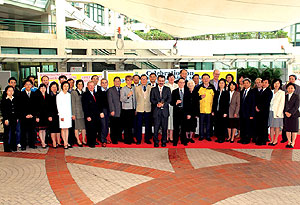|
|
| |
 |
|
| |
 |
| Guests, staff, students and alumni join together to
celebrate the Government¡¦s granting of self-accrediting
status to the Institute. |
|
|
Though the Institute passed a major milestone with the attainment
of self-accrediting status in May 2004, we can by no means rest
on our laurels. Good education demands constant enhancement and
continuing development. Our academic and research programmes,
therefore, are constantly being improved on the road to further
excellence.
The Continuous
Enhancement of Programmes
Since the Institute's establishment in 1994, we have carefully
mapped out our transformation. During this time, we have made
the transition from a post-secondary institution offering only
sub-degree programmes to our present standing, where the majority
of our programmes are at degree and postgraduate levels. The achievement
of self-accrediting status makes us a fully fledged independent
tertiary institution.
This year saw the graduation of the first cohort of students from
our Bachelor of Education (Secondary) programme, which prepares
teachers specialising in cultural and technological subjects.
2003-04 also marked the phasing out of sub-degree programmes for
the primary and secondary education sectors. Graduation is not
the end of the road for this last cohort of Certificate of Education
(Primary) and Certificate of Education (Secondary) students. The
majority of them have already enrolled in one of our top-up programmes
which will eventually take them to degree level. This migration
to higher education levels for students demonstrates our efforts
to turn out professional teachers who will specialise in their
field of study to meet Hong Kong's education needs and the community's
future aspirations.
Programme Development
- Evolving with the Times
Benefiting Our Teachers
A major feature of our planning framework involves extensive consultations
with key stakeholders - our staff and students, Hong Kong's teachers
and principals, professional associations, HKIEd's Council and
the Government. In the planning of our academic programmes, we
also work closely with local schools, the University Grants Committee
(UGC), the Education and Manpower Bureau (EMB), the Advisory Committee
on Teacher Education and Qualifications and other teacher education
providers. This enables us to review any necessary changes to
programmes in line with the latest community needs and to re-allocate
places to areas of high demand when and where necessary.
Our professional development courses have been restructured and
upgraded to cater for the changing needs of teachers and the ongoing
curriculum developments in schools. To this end, 2003-04 saw the
introduction of nine new professional development programmes :
one for primary school teachers focusing on education innovation
and eight for language teachers with an emphasis on curriculum
leadership.
|
 |
|


